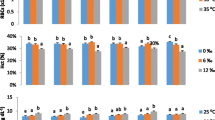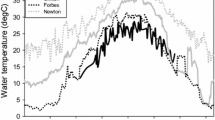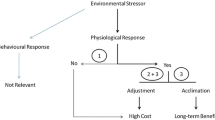Abstract
Striped Bass naturally inhabit a wide range of temperatures, yet little is known about the processes that control their acute and chronic temperature limits. The objective of this study was to determine the effect of temperature acclimation on acute thermal maxima and physiology of juvenile Striped Bass. Juvenile fish were acclimated to 15, 25 or 30 °C for 4 weeks, then split into two sampling groups: post-acclimation and post-critical thermal maximum trials. We found that fish survived in all acclimation temperatures with little change to underlying hematology, and that critical thermal maximum (CTmax) increased with increasing acclimation temperature. At CTmax, fish acclimated to 30 °C had elevated plasma cortisol, lactate and potassium levels. These results suggest that, while 30 °C is likely to be outside their thermal optima, Striped Bass can survive at high temperatures. This ability to cope with warm temperatures may provide an advantage with increasing global temperatures.




Similar content being viewed by others
Data availability
Data from this manuscript will be archived on the University of New Brunswick’s Dataverse Research Data Repository.
References
Barton BA (2002) Stress in fishes: A diversity of responses with particular reference to changes in circulating corticosteroids. Integr Comp Biol 42:517–525. https://doi.org/10.1093/icb/42.3.517
Bates D, Mächler M, Bolker B, Walker S (2015) Fitting linear mixed-effects models using lme4. 2015 67:48. https://doi.org/10.18637/jss.v067.i01
Becker CD, Genoway RG (1979) Evaluation of the critical thermal maximum for determining thermal tolerance of freshwater fish. Environ Biol Fishes 4:245–256. https://doi.org/10.1007/BF00005481
Beitinger TL, Bennett WA (2000) Quantification of the role of acclimation temperature in temperature tolerance of fishes. Environ Biol Fishes 58:277–288. https://doi.org/10.1023/a:1007618927527
Bettoli PW (2005) The fundamental thermal niche of adult landlocked Striped Bass. Trans Am Fish Soc 134:305–314. https://doi.org/10.1577/T03-204.1
Bettoli PW, Osborne RS (1998) Hooking mortality and behavior of Striped Bass following catch and release angling. N Am J Fish Manage 18:609–615.
Bœuf G, Payan P (2001) How should salinity influence fish growth? . Comp Biochem Physiol C Toxicol Pharmacol 130:411–423. https://doi.org/10.1016/S1532-0456(01)00268-X
Bradley CE, Rice JA, Aday DD, Hightower JE, Rock J, Lincoln KL (2018) Juvenile and adult Striped Bass mortality and distribution in an unrecovered coastal population. N Am J Fish Manag 38:104–119. https://doi.org/10.1002/nafm.10036
Brett JR (1971) Energetic responses of salmon to temperature. A study of some thermal relations in the physiology and freshwater ecology of sockeye salmon (Oncorhynchus nerka). Am Zool 11:99–113. https://doi.org/10.1093/icb/11.1.99
Carlson RE, Baker EP, Fuller RE (1995) Immunological assessment of hybrid Striped Bass at three culture temperatures. Fish Shellfish Immunol 5:359–373. https://doi.org/10.1006/fsim.1995.0034
Claussen D (1977) Thermal acclimation in ambystomatid salamanders. Comp Biochem Physiol A: Mol Integr Physiol 58:333–340. https://doi.org/10.1016/0300-9629(77)90150-5
Conroy CW, Piccoli PM, Secor DH (2015) Carryover effects of early growth and river flow on partial migration in Striped Bass Morone saxatilis. Mar Ecol Prog Ser 541. https://doi.org/10.3354/meps11474
Conte GL, Arnegard ME, Peichel CL, Schluter D (2012) The probability of genetic parallelism and convergence in natural populations. Proc R Soc B 279:5039–5047. https://doi.org/10.1098/rspb.2012.2146
Cook AM (2003) Growth and survival of age 0 + Shubenacadie River Striped Bass (Morone saxatilis) in relation to temperature and salinity. MSc Dissertation, Nova Scotia Agricultural College
Cook A, Duston J, Bradford R (2006) Thermal tolerance of a northern population of Striped Bass Morone saxatilis. J Fish Biol 69:1482–1490. https://doi.org/10.1111/j.1095-8649.2006.01211.x
Cook A, Duston J, Bradford R (2010) Temperature and salinity effects on survival and growth of early life stage Shubenacadie River Striped Bass. Trans Am Fish Soc 139:749–757. https://doi.org/10.1577/T08-173.1
COSEWIC (2012) COSEWIC assessment and status report on the Striped Bass (Morone saxatilis) in Canada. Committee on the Status of Endangered Wildlife in Canada, Ottawa
Coutant CC, Zachman KL, Cox DK, Pearman BL (1984) Temperature selection by suvenile Striped Bass in laboratory and field. Trans Am Fish Soc 113:666–671.
Cox DK, Coutant CC (1981) Growth dynamics of juvenile Striped Bass as functions of temperature and ration. Trans Am Fish Soc 110:226–238.
Currie S, Schulte PM (2013) Thermal stress. In: Evans DH, Claiborne JB, Currie S (eds) The physiology of fishes, 4th edn. CRC Press, Boca Raton, pp 257–287
Davis KB (2004) Temperature affects physiological stress responses to acute confinement in sunshine bass (Morone chrysops× Morone saxatilis). Comp Biochem Physiol A: Mol Integr Physiol 139:433–440. https://doi.org/10.1016/j.cbpb.2004.09.012
Davis KB, Parker NC (1990) Physiological stress in Striped Bass: effect of acclimation temperature. Aquaculture 91:349–358. https://doi.org/10.1016/0044-8486(90)90199-W
Desplanque C, Mossman DJ (2001) Bay of Fundy tides. Geoscience Canada
Dülger N, Kumlu M, Türkmen S, Ölçülü A, Eroldoğan OT, Yılmaz HA, Öçal N (2012) Thermal tolerance of European Sea Bass (Dicentrarchus labrax) juveniles acclimated to three temperature levels. J Therm Biol 37:79–82. https://doi.org/10.1016/j.jtherbio.2011.11.003
Duston J, Astatkie T, MacIsaac P (2004) Effect of body size on growth and food conversion of juvenile Striped Bass reared at 16–28 C in freshwater and seawater. Aquaculture 234:589–600
Duston J, Manríquez-Hernández J, MacInnis GM, Reesor CM, Astatkie T (2018) Striped bass early life history in the macrotidal Shubenacadie river. Trans Am Fish Soc 147:919–938. https://doi.org/10.1002/tafs.10076
Evans DH (2008) Teleost fish osmoregulation: what have we learned since August Krogh, Homer Smith, and Ancel Keys. Am J Physiol Regul Integr Comp Physiol 295:R704–R713. https://doi.org/10.1152/ajpregu.90337.2008
Evans DH, Piermarini PM, Choe KP (2005) The multifunctional fish gill: dominant site of gas exchange, osmoregulation, acid-base regulation, and excretion of nitrogenous waste. Physiol Rev 85:97–177. https://doi.org/10.1152/physrev.00050.2003
Fangue NA, Hofmeister M, Schulte PM (2006) Intraspecific variation in thermal tolerance and heat shock protein gene expression in common killifish, Fundulus heteroclitus. J Exp Biol 209:2859–2872. https://doi.org/10.1242/jeb.02260
Farrell AP (2011) Encyclopedia of fish physiology: from genome to environment. Academic, London
Fry FEJ (1947) Effects of the environment on animal activity. University of Toronto Press, Toronto
Fry F (1967) Responses of vertebrate poikilotherms to temperature. In: Rose AH (ed) Thermobiology. Academic Press, New York, NY, pp 375–409
Hochachka PW, Somero GN (2002) Biochemical adaptation: mechanism and process in physiological evolution. Oxford University Press, New York
Hothorn T, Bretz F, Westfall P (2009) Multcomp: Simultaneous inference for general linear hypotheses. Biom J 50:346–363
Kelly AM, Kohler CC (1999) Cold tolerance and fatty acid composition of Striped Bass, white bass, and their hybrids. N Am J Aquacult 61:278–285.
Kieffer JD, Currie S, Tufts BL (1994) Effects of environmental-temperature on the metabolic and acid-base responses of rainbow-trout to exhaustive exercise. J Exp Biol 194:299–317
Kir M, Sunar MC, Altindag BC (2017) Thermal tolerance and preferred temperature range of juvenile meagre acclimated to four temperatures. J Therm Biol 65:125–129. https://doi.org/10.1016/j.jtherbio.2017.02.018
Kır M (2020) Thermal tolerance and standard metabolic rate of juvenile gilthead seabream (Sparus aurata) acclimated to four temperatures. J Therm Biol 93:102739. https://doi.org/10.1016/j.jtherbio.2020.102739
Kır M, Demirci Ö (2018) Thermal tolerance and standard metabolic rate of juvenile European sea bass (Dicentrarchus labrax, Linnaeus, 1758) acclimated to four temperatures. J Therm Biol 78:209–213. https://doi.org/10.1016/j.jtherbio.2018.10.008
Lagerspetz KY (2006) What is thermal acclimation? J Therm Biol 31:332–336
Lapointe DDD (2014) Temperature, hypoxia, and mycobacteriosis: Effects on adult Striped Bass Morone saxatilis metabolic performance. Dis Aquat Org 108:113–127. https://doi.org/10.3354/dao02693
Logan M (2010) Biostatistical design and analysis using R. Wiley-Blackwell, West Sussex
Losos JB (2011) Convergence, adaptation, and constraint. Evolution 65:1827–1840. https://doi.org/10.1111/j.1558-5646.2011.01289.x
Lutterschmidt WI, Hutchison VH (1997a) The critical thermal maximum: data to support the onset of spasms as the definitive end point. Can J Zool/Rev Can Zool 75:1553–1560. https://doi.org/10.1139/z97-782
Lutterschmidt WI, Hutchison VH (1997b) The critical thermal maximum: history and critique. Can J Zool/Rev Can Zool 75:1561–1574. https://doi.org/10.1139/z97-783
Madsen SS, McCormick SD, Young G, Endersen JS, Nishioka RS, Bern HA (1994) Physiology of seawater acclimation in the striped bass, Morone saxatilis (Walbaum). Fish Physiol Biochem 13:1–11. https://doi.org/10.1007/BF00004114
Morgan JD, Iwama GK (1991) Effects of salinity on growth, metabolism, and ion regulation in juvenile rainbow and steelhead trout (Oncorhynchus mykiss) and fall chinook salmon (Oncorhynchus tshawytscha). Can J Fish Aquat Sci 48:2083–2094. https://doi.org/10.1139/f91-247
Morley SA, Peck LS, Sunday JM, Heiser S, Bates AE (2019) Physiological acclimation and persistence of ectothermic species under extreme heat events. Global Ecol Biogeogr 28:1018–1037. https://doi.org/10.1111/geb.12911
Otwell WS, Merriner JV (1975) Survival and growth of juvenile Striped Bass, Morone saxatilis, in a factorial experiment with temperature, salinity and age. Trans Am Fish Soc 104:560–566.
Pavey SA, Gaudin J, Normandeau E, Dionne M, Castonguay M, Audet C, Bernatchez L (2015) RAD sequencing highlights polygenic discrimination of habitat ecotypes in the panmictic American eel. Curr Biol 25:1666–1671. https://doi.org/10.1016/j.cub.2015.04.062
R (2008) R: A Language and environment for statistical computing. R Foundation for Statistical Computing, Vienna
Rajaguru S (2002) Critical thermal maximum of seven estuarine fishes. J Therm Biol 27:125–128. https://doi.org/10.1016/S0306-4565(01)00026-2
Schulte PM (2015) The effects of temperature on aerobic metabolism: towards a mechanistic understanding of the responses of ectotherms to a changing environment. J Exp Biol 218:1856–1866. https://doi.org/10.1242/jeb.118851
Schulte PM, Healy TM, Fangue NA (2011) Thermal performance curves, phenotypic plasticity, and the time scales of temperature exposure. Integr Comp Biol 51:691–702. https://doi.org/10.1093/icb/icr097
Secor DH, Houde ED (1995) Temperature effects on the timing of Striped Bass egg production, larval viability, and recruitment potential in the Patuxent River (Chesapeake Bay. Estuaries 18:527–544. https://doi.org/10.2307/1352370
Secor DH, Piccoli PM (2007) Oceanic migration rates of Upper Chesapeake Bay striped bass (Morone saxatilis), determined by otolith microchemical analysis. Fish Bull 105:62–73
Secor DH, Gunderson TE, Karlsson K (2000) Effect of temperature and salinity on growth performance in anadromous (Chesapeake Bay) and nonanadromous (Santee-Cooper) strains of Striped Bass Morone saxatilis. Copeia 2000:291–296
Sunday JM, Bates AE, Dulvy NK (2011) Global analysis of thermal tolerance and latitude in ectotherms. Proc R Soc Lond Ser B: Biol Sci 278:1823–1830. https://doi.org/10.1098/rspb.2010.1295
van den Avyle MJ, Evans JW (1990) Temperature selection by Striped Bass in a Gulf of Mexico Coastal River System. N Am J Fish Manag 10:58–66. https://doi.org/10.1577/1548-8675
Whitehead A (2012) Comparative genomics in ecological physiology: toward a more nuanced understanding of acclimation and adaptation. J Exp Biol 215:884–891. https://doi.org/10.1242/jeb.058735
Wilde GRGGR (2000) Bait and temperature effects on Striped Bass hooking mortality in freshwater. N Am J Fish Manage 20:810–815.
Withers P (2020) Warm weather is possible cause for Shubenacadie River fish kill. https://www.cbc.ca/news/canada/nova-scotia/warm-weatherfish-kill-shubenacadie-river-1.5633432. Accessed8 March 2021
Woiwode JG, Adelman IR (1992) Effects of starvation, oscillating temperatures, and photoperiod on the critical thermal maximum of hybrid Striped× White Bass. J Therm Biol 17:271–275. https://doi.org/10.1016/0306-4565(92)90066-O
Wood C, Turner J, Graham M (1983) Why do fish die after severe exercise? J Fish Biol 22:189–201. https://doi.org/10.1111/j.1095-8649.1983.tb04739.x
Zhang Y, Kieffer JD (2014) Critical thermal maximum (CTmax) and hematology of shortnose sturgeons (Acipenser brevirostrum) acclimated to three temperatures. Can J Zool/Rev Can Zool 92:215–221. https://doi.org/10.1139/cjz-2013-0223
Ziegeweid J, Jennings C, Peterson D, Black M (2008) Effects of salinity, temperature, and weight on the survival of young-of-year shortnose sturgeon. Trans Am Fish Soc 137:1490–1499. https://doi.org/10.1577/t07-046.1
Acknowledgements
Funding for this project was provided by Natural Sciences and Engineering Research Council of Canada, Canada Research Chair, University of New Brunswick, New Brunswick Innovation Foundation, and the Canada Foundation for Innovation. The authors would like to thank Dr. J Duston at the Haley Institute at Dalhousie Faculty of Agriculture, Truro for the fish used in this manuscript. Also, Dr. J Keffer for useful insight in preparing this manuscript.
Author information
Authors and Affiliations
Corresponding author
Ethics declarations
Ethics approval
All experiments were assessed and approved by the University of New Brunswick Saint John’s Animal Care Committee as directed by the Canadian Council of Animal Care (Protocols 2017-2 S-08, 2018-2R-01 and 2019-2R-05).
Conflict of interest
The authors are not aware of any conflicts of interest.
Additional information
Publisher’s note
Springer Nature remains neutral with regard to jurisdictional claims in published maps and institutional affiliations.
Rights and permissions
About this article
Cite this article
Penny, F.M., Pavey, S.A. Increased acute thermal tolerance and little change to hematology following acclimation to warm water in juvenile Striped Bass, Morone saxatilis. Environ Biol Fish 104, 489–500 (2021). https://doi.org/10.1007/s10641-021-01088-6
Received:
Accepted:
Published:
Issue Date:
DOI: https://doi.org/10.1007/s10641-021-01088-6




